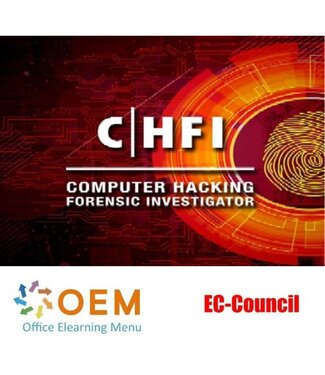De cursus Computer Hacking Forensic Investigator (CHFI) biedt de beveiligingsdiscipline van digitaal forensisch onderzoek vanuit een leveranciersneutraal perspectief. CHFI is een uitgebreide cursus die belangrijke scenario's voor forensisch onderzoek behandelt en studenten in staat stelt de nodige praktische ervaring op te doen met verschillende forensische onderzoekstechnieken en standaard forensische hulpmiddelen die nodig zijn om met succes een forensisch computeronderzoek uit te voeren dat leidt tot de vervolging van daders.
De CHFI-certificering geeft deelnemers (wetshandhavers, systeembeheerders, beveiligingsfunctionarissen, defensie- en militair personeel, juridische professionals, bankiers, beveiligingsprofessionals en iedereen die zich zorgen maakt over de integriteit van de netwerkinfrastructuur.) de nodige vaardigheden om een effectieve digitaal forensisch onderzoek.
CHFI presenteert een methodologische benadering van computerforensisch onderzoek, waaronder zoeken en in beslag nemen, chain-of-custody, acquisitie, bewaring, analyse en rapportage van digitaal bewijsmateriaal.
The course was designed and developed by experienced SMEs and digital forensics practitioners
A complete vendor neutral course covering all major forensics investigations technologies and solutions
Detailed labs for hands-on learning experience; approximately 50% of training time is dedicated to labs
It covers all the relevant knowledge-bases and skills to meets with regulatory compliance standards such as ISO 27001, PCI DSS, SOX, HIPPA, etc
The program presents a repeatable forensics investigation methodology required from a versatile digital forensic professional which increases your employability
The CHFI program is designed for all IT professionals involved with information system security, computer forensics, and incident response.
In order to maintain the high integrity of our certification exams, EC-Council Exams are provided in multiple forms (I.e. different question banks). Each form is carefully analyzed through beta testing with an appropriate sample group under the purview of a committee of subject matter experts that ensure that each of our exams not only has academic rigor but also has “real world” applicability. We also have a process to determine the difficulty rating of each question. The individual rating then contributes to an overall “Cut Score” for each exam form. To ensure each form has equal assessment standards, cut scores are set on a “per exam form” basis. Depending on which exam form is challenged, cut scores can range from 60% to 78%.


